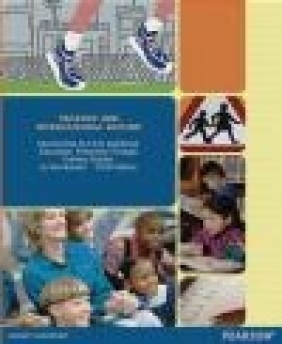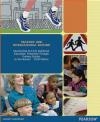Introduction to Early Childhood Education
Jo Ann Brewer
Introduction to Early Childhood Education
Jo Ann Brewer
- Producent: Pearson
- Rok produkcji: 2013
- ISBN: 9781292042015
- Ilość stron: 588
- Oprawa: Miękka
Niedostępna
Opis: Introduction to Early Childhood Education - Jo Ann Brewer
This text is a thorough examination of day-to-day aspects of standards-based, developmentally appropriate teaching of young children. Using student-friendly, readable language, Jo Ann Brewer demonstrates how to integrate developmentally appropriate practice into the early childhood curriculum. The extensive coverage of curriculum, particularly early literacy and language, is a hallmark of this popular text. Unlike other texts in the market, there is a heavy focus on diversity, students with special needs, and real-world experience from teachers currently in the classroom.Table of Contents Every chapter begins with a "Table of Contents" and "Focus Questions." Each chapter contains "Summary," "Reflection," "Explorations and Activities," "An Expert Speaks," "Celebrating Diversity," "Chapter Summary," "Key Terms," "Children with Special Needs" and "Resources for Further Reading." Part One: Foundations of Early Childhood Learning 1. Young Children Growing, Thinking, and Learning Developmentally Appropriate Practice. Theories of Development Behaviorist Theory Maturationist Theory Constructivist Theory Multiple Intelligence Theory Social Learning Theory Ecological Systems Theory Theoretical Influences on Teaching Theoretical Influences on Observations Children's Development Physical Development Social Development Emotional Development Intellectual Development 2. Designing Schools for Young Children Early Schools for Young Children Key People in Early Childhood Education Other Influences on Early Childhood Education Changes in Early Childhood Education The Child-Care Movement Kindergarten Head Start Programs for Children with Special Needs Early Intervention Programs Contemporary Models of Early Childhood Programs The Montessori Model The Behaviorist Model The Constructivist Model Summaries and Comparisons Research on Program Models 3. Creating an Environment for Learning Planning a Learning Environment Structuring a Physical Environment Room Arrangement Physical Climate Assessing the Environment Instructional Materials Learning Areas Beginning the Year Managing Learning Areas Planning the Outdoor Environment Planning for Safety-Inside and Out 4. Planning Learning Activities. Curriculum Design Curriculum Organization Developmentally Appropriate Curriculum Rationale for an Integrated Curriculum Selecting a Theme Implementing the Theme Evaluating the Theme Learning Plans Mandated Lessons and Goals Multicultural Education and Anti-Bias Curriculum Computers in Early Childhood Programs Teaching and Learning with Computers Young Children Online Scheduling Details of the Schedule Simplifying Routines Adapting the Schedule Kindergarten: Half-Day, Full-Day, and Alternate-Day Programs Other Scheduling Issues 5. Play: Learning at Its Best Defining Play Types of Play Characteristics of Play Levels of Play Purposes of Play Intellectual Development Social and Emotional Development Physical Development Development of Play Behaviors Infancy Preschool Early Primary Grades Middle Childhood Play in School Settings Roles of the Teacher Play in Primary Classrooms Benefits of Play at School Selecting Materials for Play Play as a Teaching Strategy Communicating the Benefits of Play Play and Academic Learning Outdoor Play 6. Guidance Defining Discipline, Punishment, and Guidance Punishment Guidance Planning for Guidance in the Classroom Preventing Behavior Problems Strategies for Guiding Behavior Teaching Skills and Behaviors Guiding Groups Making Guidance Decisions Behavior-Management Systems Assertive Discipline Glasser Model Ginott Model Dreikurs Model Assessing Behavior-Management Systems 7. Assessment and Reporting Defining Assessment and Testing Types of Assessment Types of Tests Testing Young Children High-Stakes Testing No Child Left Behind (NCLB) Act Strategies for Assessment Tallies Running Narratives or Logs Incident Records Narratives Anecdotal Records Checklists and Rating Scales Records of Conversations, Conferences, and Interviews Rubrics Parent Questionnaires Self-Evaluations Organizing Assessment Data Portfolios Reporting Assessment Data Report Cards Conferences Student-Led Conferences Narrative Reports Telephone Calls Casual Conversations Newsletters Videotapes Evaluating Assessment and Reporting Program Assessment 8. Working with Parents and Paraprofessionals Parent Involvement Realities of Parent-Teacher Relationships Implications for Teachers Encouraging Parent Involvement Teacher and School Strategies Parent Roles Activities for Involving Parents Communication with Parents School Handbooks Home Visits Parent Visits to School Letters and Notes Telecommunication Community Resources Volunteers in the Classroom Working with Paraprofessionals Part Two: Content Area Curriculum 9. Celebrating the Magic of Language Defining Language Characteristics of Language Systems of Language Learning Language Sequence of Language Development Theoretical Models of Language Learning Teaching Language Creating an Effective Environment Standards for Language Development Observing Language Learners Providing Activities That Encourage Language Growth 10. Developing Literacy Defining Literacy Teacher Qualities that Support Literacy Evaluating the Research Understanding How Literacy Develops Standards for Reading Teachers Program Elements That Support Literacy Goals of Literacy Instruction Standards for Literacy Development Oral Language and Listening Skills Music as a Literacy Activity Reading Aloud and Storytelling Learning about Print Attending to Sound Presenting Selected Text Commercial Programs for Literacy Instruction Helping all Children Feel Successful as Literacy Learners Learning to Write Development of Writing Conventions of Written Language The Writing Process with Young Children Assessing the Development of Literacy Observing Oral Language Observing Writing Determining Knowledge of Books and Print Observing Reading 11. Manipulation and Discovery through Mathematics Defining Mathematics Learning Mathematics Teaching Mathematics Standards for Mathematics Education The Strand Model Materials for Mathematics Instruction Manipulatives Calculators and Computers Integrating Mathematics into the Curriculum Mathematics and Play Mathematics and Literacy Mathematics and Literature Assessment of Mathematical 12. Manipulation and Discovery through Science Defining Science Learning Science Manipulation, Observation, and Discovery The Scientific Process Teaching Science Ensuring Safety Teaching Basic Concepts and Encourage Positive Attitudes Planning the Sequence of Activities Standards for Science Education Integrating Science into the Curriculum Science and Literacy 13. Encouraging the Creative Arts The Importance of Art Experiences Goals of Arts Education Standards for Arts Education Visual Arts Stages in Development Goals of Visual Arts Experiences Standards for Visual Arts Education Suggested Visual Arts Experiences Art versus Craft Activities Music Goals of Music Program Standards for Music Education Singing Playing Instruments Listening Experiences Approaches to Music Instruction Movement and Dance Movement Experiences Dance Education Standards for Dance Education Drama Encouraging Drama Standards for Drama Education Roles of the Specialists Assessing Experiences in the Arts Integrating the Arts into the Curriculum 14. Living Together: The Social Studies Defining Social Studies Learning Social Studies A Constructivist View Teaching Social Studies Multiple Views of the Social Studies Curriculum Current Expectations Standards for Social Studies Education Planning Social Studies Experiences Integrating Social Studies into the Curriculum Social Studies Themes Celebrating Holidays 15. Promoting Wellness: Physical Education and Health, Nutrition, and Safety Education Physical Education Encouraging Motor Development Goals of Physical Development Programs Standards for Physical Education Physical Education Activities Health, Nutrition, and Safety Education Health Education Nutrition Education Safety Education Integrating Physical Education and Health, Nutrition, and Safety Education into the Curriculum
Producent:
GPSR Pearson Central Europe Sp. z o.o.
ul. Szamocka 8
01-748 Warszawa (PL)
tel: 459 596 060
email: [email protected]
Szczegóły: Introduction to Early Childhood Education - Jo Ann Brewer
Tytuł: Introduction to Early Childhood Education
Autor: Jo Ann Brewer
Producent: Pearson
ISBN: 9781292042015
Rok produkcji: 2013
Ilość stron: 588
Oprawa: Miękka
Waga: 1.26 kg

























